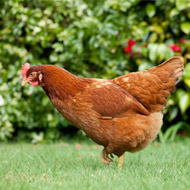
The government’s chief vet has confirmed a new targeted approach to controlling avian influenza in England, following plans set out earlier this month.
A prevention zone currently in place requiring all birds to be housed indoors will expire on 28 February. The new zone will then come into force and is expected to remain until at least the end of April. It will allow most poultry keepers the option to let birds outside, whilst still taking reasonable precautions to prevent avian influenza.
However, keepers in higher risk areas - close to large bodies of water where wild waterfowl gather - must continue to keep birds housed or netted. An interactive map pinpoints the high risk areas: http://www.gisdiseasemap.defra.gov.uk/intmaps/avian/map.jsp
All other keepers will be able to choose to either continue housing birds or let them into fenced areas. They must, however, follow strict guidance from Defra to reduce the risk of infection, including a risk assessment check that outdoor areas are not contaminated and the risk of contact with wild birds is low. Keepers with any concerns are advised to continue to housing birds or keep them in covered runs or netted areas.
A ban on poultry shows and gatherings remains in place across Great Britain.
Chief veterinary officer Nigel Gibbens said: “Effective disease control will always be our priority. H5N8 continues to circulate in wild birds and we must all continue to do everything we can to reduce the risk of disease. All keepers across the country must follow strict mandatory disease prevention measures.
“Based on clear scientific evidence, the risk from wild birds is too high in some areas of England to rely on biosecurity measures alone. That’s why we are requiring birds in Higher Risk Areas to be housed or protected from wild bird contact by netting.
“We believe this is the best approach to control disease, protect birds’ welfare and ensure consumers can buy free range products. As with any disease control measures these will be kept under review based on the latest situation and up-to-date scientific advice.”



 RCVS Knowledge has welcomed Professor Peter Cockcroft as editor-in-chief for Veterinary Evidence.
RCVS Knowledge has welcomed Professor Peter Cockcroft as editor-in-chief for Veterinary Evidence.